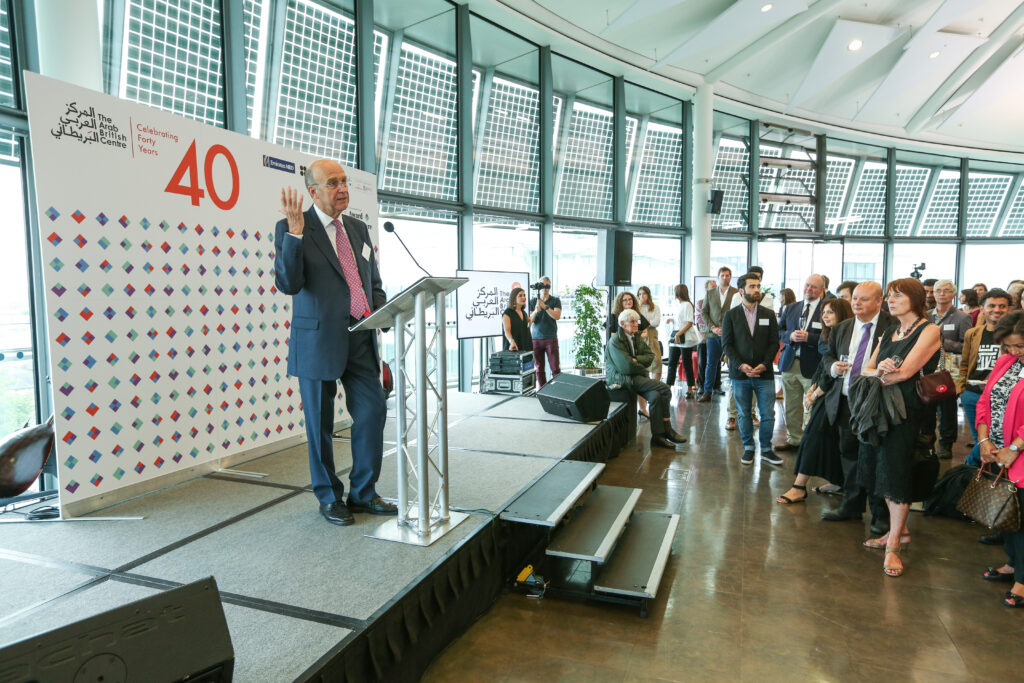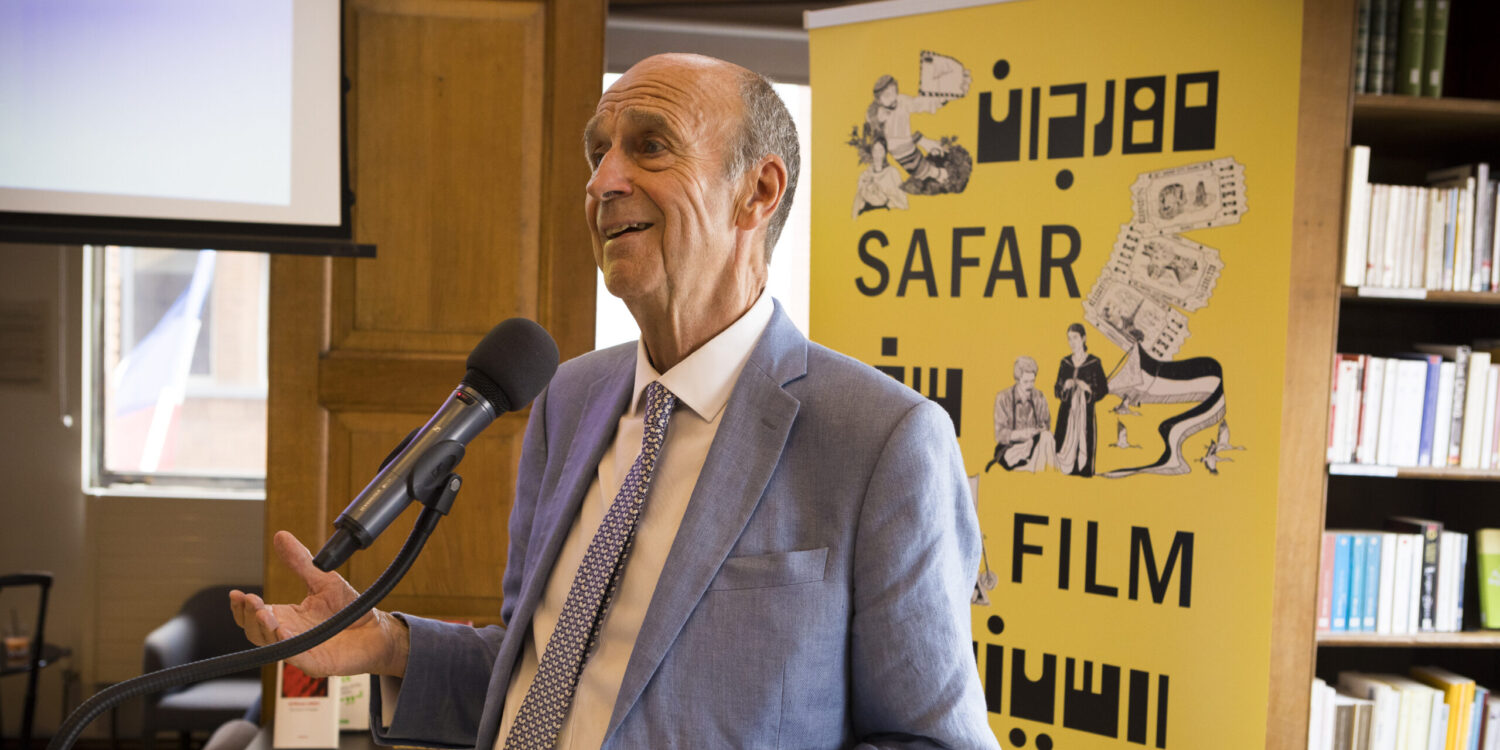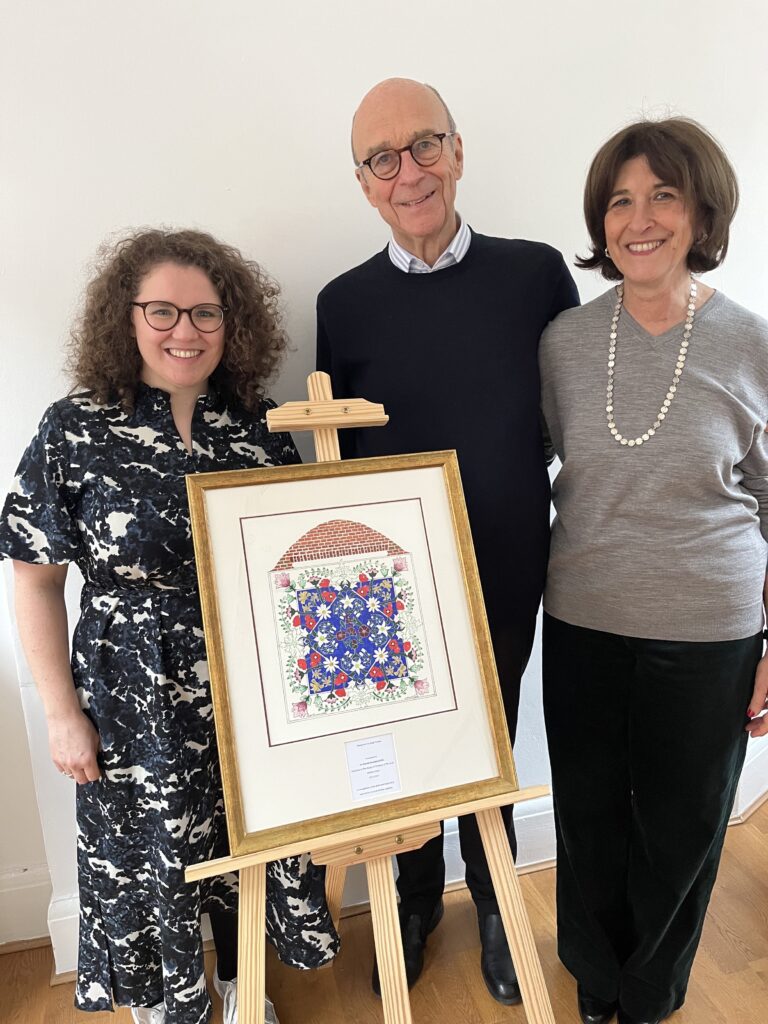After seven years as Chair and reaching the end of his term, Sir Derek Plumbly has stepped down from the Board of Trustees of the Arab British Centre. Sir Derek first joined the Centre as Chair in 2016 after being recommended by then-Board member Brian Constant who knew him from his time at the Foreign Office. After meeting with him, the Executive Team knew he would be perfect for the role and since then, his dedication to the Centre has been second to none: from helping us navigate the Covid 19 pandemic, to advocating for the development of programmes like SAFAR and Arab Britain. The whole team will miss him a lot and we wish him all the best for the future!
Sir Derek has long experience as a diplomat and international official in the Arab world. From 2012 to 2015 he was the UN Special Coordinator for Lebanon prior to which for three years he chaired the international commission which oversaw implementation of the Comprehensive Peace Agreement in Sudan. He was British ambassador to Egypt from 2003 to 2007 and Saudi Arabia from 2000 to 2003. His earlier career in the FCO included postings to the UK mission to the UN in New York and as Deputy Head of Mission in Riyadh. He speaks Arabic which he studied in Lebanon and Jordan after graduating from Oxford and teaching with VSO in Pakistan. He was appointed CMG in 1991 and KCMG in 2000. Sir Derek is Visiting Professor of Middle East Studies at King’s College London. He and his wife, Nadia Youssef Gohar, have two sons and a daughter.
To mark his departure and celebrate his tenure, we asked Sir Derek to reflect on his time with the Arab British Centre in a short interview. Read below to find out about his highlights, his challenges and his advice for the next Chair.
What achievement are you most proud of during your time at the Arab British Centre?
It has been a seven-year journey. There have been lots and it is difficult to choose. Maybe the biggest, for which we have to thank the brilliant team at the Centre and the network of partners and supporters who have made it possible, is the growth of SAFAR to be an annual festival with screenings of Arab films across the UK and a programme of discussions and workshops with filmmakers.
Film is maybe the best way of reaching the wider audience for Arab culture which we seek. I have vivid memories of some of the outstanding films we have shown – from Mohamed Khan’s last work ‘Before the Summer Crowds’ in 2016 to the extraordinary Sudanese film ‘You will die at 20’ last year and the Algerian historical drama ‘The Last Queen’ which opened this year’s festival..
I spoke to a German couple who had lived in the Middle East after one of the screenings in July who told me that they were timing their annual holidays in London to coincide with SAFAR; that just about sums up how far we’ve come in a few years.
What brought you to the Arab British Centre?
I remembered visiting the Centre in its old building in Kensington in the 1990s to talk to CAABU, a Centre resident organisation then as now. Brian Constant a veteran board member with similar memories approached me soon after I returned from my UN job in Beirut. I met Nadia El-Sebai, the executive director. She was then relatively new in the job. I was impressed by her vision for the Centre’s development, loved its pan-Arab mission, and the building in Gough Square- it’s location, the books and of course the people – and signed up.
What have been the biggest challenges during your tenure?
The ongoing challenge, to which the Centre seeks to respond, is that of negative perceptions, misunderstandings, or just plain ignorance of the Arab world, and of Arab achievements in the UK. The Arab Britain programme of artistic and community activity has been one response to that. I am sure it will grow.
Funding for programmes is an ever present challenge, still more so is covering our core costs. The Centre is a charity with a limited endowment which will not last for ever. This is not an issue which will go away. If you value its work, don’t be shy about supporting it.
Covid was a major unexpected challenge. I am glad to say we responded very quickly. The board further supported resident organisations by halving service charges even though we had obviously to sustain the building and maintain essential services and so on. The programmes – including SAFAR – and courses moved on line. The team organised on line hangouts with Arab and Arab British artists and personalities from Manal AlDowayan to Sami Tamimi. Our audiences very quickly went global. Nonetheless I am glad to say that we have reverted to a largely in-person model for activities. And the number of resident organisations with offices or desks in the building has actually grown since Covid which hopefully bodes well for the future.
Do you have a highlight or happy memory you’d like to share?
There are many. Randomly perhaps I might mention two…The first would be the celebration, in City Hall in 2017, of the 40th anniversary of the opening of the Centre by the then Foreign Secretary and the Secretary General of the Arab League. David Owen returned for the celebration. Mahmoud Riad’s successor sent a message of support. A short film about the Centre’s history was made for the occasion, with the participation the original caretaker, Mary Pyves, who was also present in City Hall. Awards for their contribution to Arab culture in the UK were given to the playwright Hannah Khalil and Arts Canteen. The buzz generated by the evening lasted for a long time.
The second happened in Belfast early in 2020. In 2019 the Centre, with British Council support, had organised an exchange programme which took young artists from the four nations of the UK to Kuwait to work with counterparts there and then reversed the experience with a visit by their Kuwaiti counterparts to the UK. The Belfast event was the opening of an exhibition at Belfast Exposed of the work a young photographer Ben Malcolmson had produced as a result of his visit. It was great and the discussion with members of the audience about the past conflicts which still shaped both societies a generation later made the journey all the more worthwhile.

Sir Derek at the Arab British Centre Award for Culture 2017 and 40th Anniversary Reception
How did it feel to stand down?
For me, the past few months have been dominated first by the war in Sudan where I’d spent three years trying to help turn a page and build a way out of earlier conflicts, and now – like most of us- by the horrendous events in Gaza. My retirement was determined months ago by age and the length of time I’ve spent in the job. I actually stood down in October. I am proud I was still able as chair to attend the gathering for Gaza with Palestinian and other Arab writers and musicians which the team and partners put together in the space of a week at the Grand Junction in Paddington to raise funds for Medical Aid for Palestinians. It was inspiring and very much in line with the priority the Centre has throughout its history given to Palestine.
What advice have you for the next chair?
My advice above all would be to trust the team, and their ideas – challenge them sometimes but always take them seriously! Nadia and Amani have done extraordinarily well in my time with the Centre, both in managing and enhancing its role as a hub for like-minded organisations, residents and others, in the UK and partners across the region and in developing its own cultural programmes and activities.
Ditto for the board, which as I stand down is expanding with new, well-qualified members already familiar with the Centre as well as members from the dedicated group I have worked with over the years including the interim chair, Haroun Al-Mishwit.
And don’t be shy about speaking up publicly for the Centre and it’s twofold mission. Sometimes I feel that I have been too reticent about it’s accomplishments- something that is compounded by the fact that the programmes tend to work under other names, SAFAR or whatever, so the Centre is far from being a household name.
What are your hopes for the Arab British Centre?
That it will grow, and be still better able to carry its mission – which if anything is even more urgent today than it was when the Centre first opened. The building again needs updating and improvement if it is it to receive more visitors and host rather larger events. And for activities and programmes to grow a regular team of more than four will eventually be needed. But there is time and plenty of potential advocates. The aspiration is there and ultimately I believe it will be fulfilled.
What’s next for you and will you continue to be involved with the Arab British Centre?
I am 75. I look forward to having a little more time for travel and grandchildren. But I will be back to see friends and take advantage of the library. And I will remain an enthusiastic follower of the Centre’s events and stand ready to help where I can.


